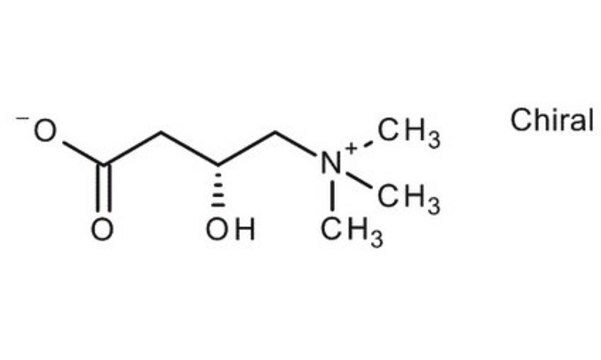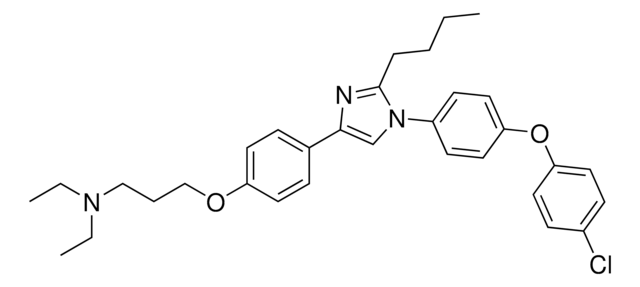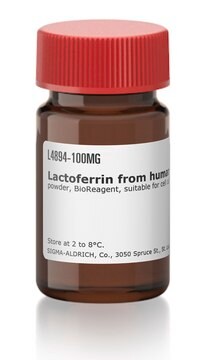Wszystkie zdjęcia(1)
Key Documents
E8780
Epiregulin from mouse
recombinant, expressed in E. coli, lyophilized powder, suitable for cell culture
Synonim(y):
EREG
Zaloguj sięWyświetlanie cen organizacyjnych i kontraktowych
About This Item
Numer MDL:
Kod UNSPSC:
12352200
Polecane produkty
rekombinowane
expressed in E. coli
Próba
≥97% (SDS-PAGE)
Postać
lyophilized powder
masa cząsteczkowa
predicted mol wt ~5.5 kDa
metody
cell culture | mammalian: suitable
zanieczyszczenia
endotoxin, tested
numer dostępu UniProt
temp. przechowywania
−20°C
informacje o genach
mouse ... Ereg(13874)
Działania biochem./fizjol.
Binds and activates the tyrosine kinase ErbB family receptors (ErbB1-ErbB4). Inhibits the growth of several epithelial tumor cells and stimulates the growth of fibroblasts and other cell types. Its expression is upregulated in a number of carcinoma cell lines.
Postać fizyczna
Lyophilized from a 0.2 μm filtered solution in phosphate buffered saline containing 0.5 mg bovine serum albumin.
Uwaga dotycząca przygotowania
Recombinant Mouse Epiregulin is produced from a DNA sequence encoding the mature mouse epiregulin protein sequence. The protein is expressed in E. coli.
Epiregulin is a member of EGF (epidermal growth factor) family. All members of the EGF family are synthesized as transmembrane precursors and converted to soluble forms by proteolytic cleavage. Epiregulin was originally purified from the mouse fibroblast-derived tumor cell line NIH3T3/T7. Mouse epiregulin cDNA encodes a transmembrane precursorof 162 amino acids with a mature soluble form consisting of residues 56-101. Epiregulin acts like other EGF family members by binding to and activating the tyrosine kinase ErbB family receptors (ErbB1-ErbB4). Epiregulin has a broad specificity, but this ligand seems to preferentially activate heterodimeric receptor complexes. Epiregulin inhibits the growth of several epithelial tumor cells and stimulates the growth of fibroblasts and other types of cells. Its expression is upregulated in a number of carcinoma cell lines. Epiregulin is also an autocrine growth factor in human epidermal keratinocytes, and involved in the early stages of pregnancy, regulating the attachment of the blastocyst to the uterine epithelium during the implantation process.
Epiregulin is a member of EGF (epidermal growth factor) family. All members of the EGF family are synthesized as transmembrane precursors and converted to soluble forms by proteolytic cleavage. Epiregulin was originally purified from the mouse fibroblast-derived tumor cell line NIH3T3/T7. Mouse epiregulin cDNA encodes a transmembrane precursorof 162 amino acids with a mature soluble form consisting of residues 56-101. Epiregulin acts like other EGF family members by binding to and activating the tyrosine kinase ErbB family receptors (ErbB1-ErbB4). Epiregulin has a broad specificity, but this ligand seems to preferentially activate heterodimeric receptor complexes. Epiregulin inhibits the growth of several epithelial tumor cells and stimulates the growth of fibroblasts and other types of cells. Its expression is upregulated in a number of carcinoma cell lines. Epiregulin is also an autocrine growth factor in human epidermal keratinocytes, and involved in the early stages of pregnancy, regulating the attachment of the blastocyst to the uterine epithelium during the implantation process.
Komentarz do analizy
The biological activity is measured by its ability to stimulate the 3H-thymidine incorporation in a mouse fibroblast cell line, Balb/3T3.
This page may contain text that has been machine translated.
Kod klasy składowania
11 - Combustible Solids
Klasa zagrożenia wodnego (WGK)
WGK 3
Temperatura zapłonu (°F)
Not applicable
Temperatura zapłonu (°C)
Not applicable
Środki ochrony indywidualnej
Eyeshields, Gloves, type N95 (US)
Certyfikaty analizy (CoA)
Poszukaj Certyfikaty analizy (CoA), wpisując numer partii/serii produktów. Numery serii i partii można znaleźć na etykiecie produktu po słowach „seria” lub „partia”.
Masz już ten produkt?
Dokumenty związane z niedawno zakupionymi produktami zostały zamieszczone w Bibliotece dokumentów.
K Hashimoto
Journal of dermatological science, 24 Suppl 1, S46-S50 (2001-01-04)
Various kinds of growth factors are involved in the regulation of human keratinocyte function. Among them, the epidermal growth factor (EGF) family and the transforming growth factor-beta (TGF-beta) family play central roles, providing dual-mode regulation of keratinocyte growth through the
H Toyoda et al.
FEBS letters, 377(3), 403-407 (1995-12-27)
A cDNA clone encoding a novel epidermal growth factor (EGF)-related growth regulator, epiregulin, was isolated from a cDNA library prepared from a mouse fibroblast-derived tumor cell line, NIH3T3/clone T7. The predicted amino acid sequence revealed that the purified epiregulin peptide
Jian-Bo Fan et al.
Molecular and cellular biochemistry, 398(1-2), 105-113 (2014-09-17)
Epidermal growth factor (EGF) receptor (EGFR) emerges as an essential molecule for the regulating of osteoblast cellular functions. In the current study, we explored the effect of epiregulin, a new EGFR ligand, on osteoblast functions in vitro, and studied the
K P Karey et al.
Cancer research, 48(14), 4083-4092 (1988-07-15)
A completely serum-free assay method has been used to compare the mitogenic activities of polypeptide growth factors and estrogens with MCF-7 and T47D human breast cancer cells in culture. The lines were maintained in a viable, slowly dividing condition in
Teresa Elo et al.
Endocrine-related cancer, 21(4), 677-690 (2014-06-19)
Estrogens contribute to the development and growth of the prostate and are implicated in prostate tumorigenesis. In their target tissues, estrogens mediate their effects via estrogen receptor α (ERα (ESR1)) and β (ERβ (ESR2)). Hyperplasia and decreased differentiation of epithelial
Nasz zespół naukowców ma doświadczenie we wszystkich obszarach badań, w tym w naukach przyrodniczych, materiałoznawstwie, syntezie chemicznej, chromatografii, analityce i wielu innych dziedzinach.
Skontaktuj się z zespołem ds. pomocy technicznej





